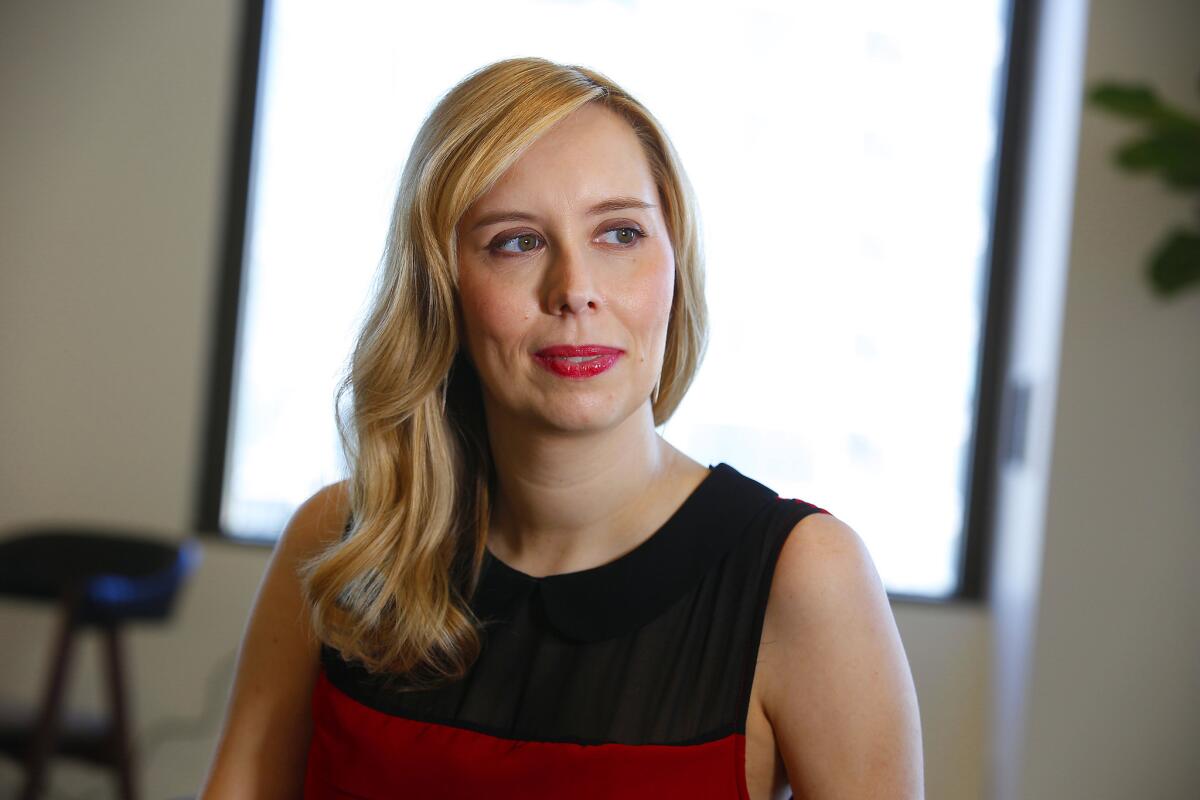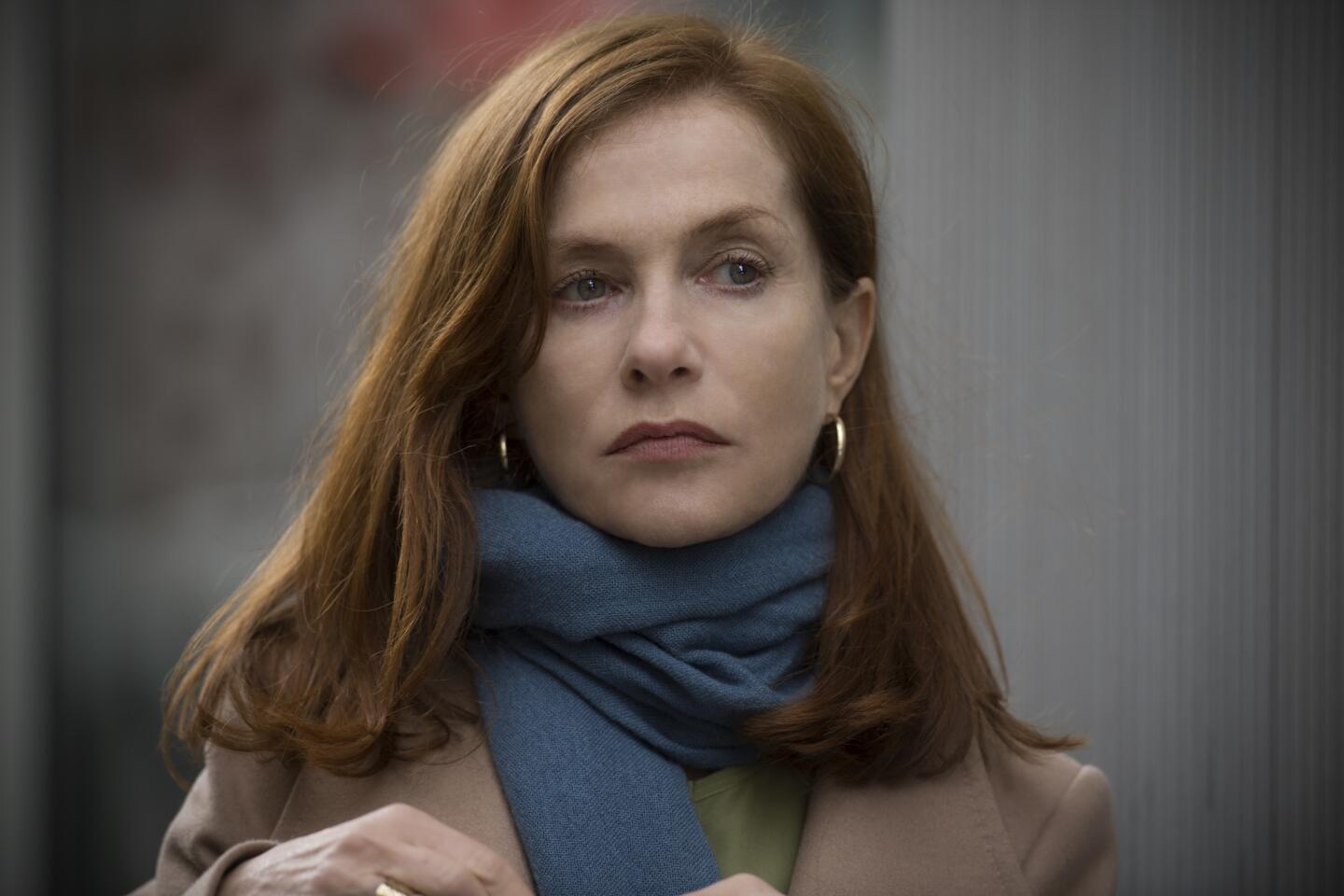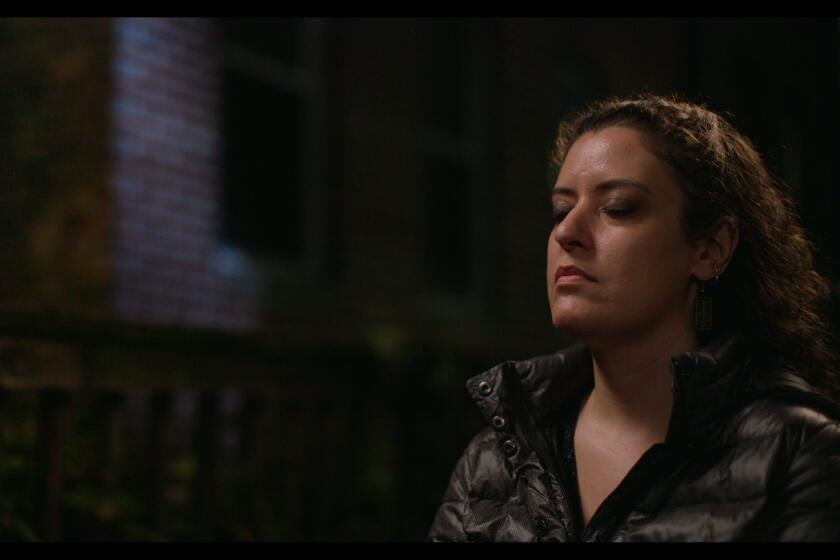Meet Allison Schroeder, the NASA-loving writer of ‘Hidden Figures’ who was just nominated for an Oscar

Allison Schroeder was on the playground in 1986, chasing a friend around the slide, when the space shuttle Challenger exploded. As a first-grader, she was confused by the blast visible from her neighborhood, just 30 minutes south of the launch pad in Cape Canaveral. So she looked toward her teacher, who’d begun to cry. That’s when she realized something terrible had occurred.
After school, before the shuttle’s cabin had been been recovered, she gathered a group of her friends and organized a search party. On bicycles, they rode around their neighborhood looking for the astronauts in vacant lots.
For the record:
7:45 a.m. Nov. 16, 2024An earlier version of this post said that Allison Schroeder spent 12 weeks between the hours of 11 a.m. and dawn writing the script to “Hidden Figures.” It was between 11 p.m. and dawn during the 12 weeks that she wrote the script.
“I was so sure I could save them,” Schroeder, now 38, recalls.
This is only one of the many ways NASA has touched Schroeder’s life. Her grandparents worked there. She interned there in high school, learning binary coding and how to build a circuit board. After her freshman year at Stanford, where she majored in economics, she spent a summer working at a missile launch company. And now, NASA is at the heart of the movie that has earned her an Oscar nomination.
Live coverage: Analysis, reactions, snubs, surprises and more on the 2017 Oscar nominations »

Taraji P. Henson, Octavia Spencer and Janelle Monáe star in “Hidden Figures.”
When she heard that Hollywood producers were looking for a screenwriter to write a film called “Hidden Figures” about three little-known female African American NASA mathematicians, she knew she had to write it.
“We got on the phone and she said, ‘I have a feeling for this story in a big, big way,’” said Donna Gigliotti, the producer who would go on to hire Schroeder to adapt “Hidden Figures” from a book proposal into a script. “And I’ve been around the block a few times. I genuinely rolled my eyes and was like, ‘OK. You tell me why.’ And when she told me why, it was kind of undeniable.”
Before Schroeder landed the “Hidden Figures” gig — her first major feature screenplay — she’d been struggling to get writing jobs. After finishing the graduate film program at USC, she was hired as a staff writer on the CW’s reboot of “90210.” But after the program was canceled, she had trouble finding more work. She pitched 44 projects in a row and didn’t book a single one.
“I think a lot of times people look at me and say, ‘Well, we can’t possibly hand a show over to her to run,” Schroeder says. “It seemed like executives would be worried about me controlling a room and having power, and I’d say, ‘Oh, I can control a room. I can give an order like nobody’s business.’ I think there’s an unconscious bias, and it gets a little disheartening after a while.”
A few days after “Hidden Figures” hit theaters, she was sitting on a pillow in her modest two-bedroom apartment in West Hollywood. Seven weeks prior, she’d broken her tailbone while giving birth to her first daughter, Emily. Her husband, a television writer on Netflix’s “Santa Clarita Diet,” was tending to their newborn.
It was in this apartment, on a L-shaped couch between 11 p.m. and dawn, that Schroeder spent 12 weeks as a night owl writing “Hidden Figures.” She was tasked with writing the screenplay at the same time that author Margot Lee Shetterly was writing the book the movie is based on. Shetterly shared all of her research with Schroeder — everything including thesis papers, housing surveys and Jim Crow rulings.
“She was very, very interested in getting this right and really putting the spirit of the real people onto the screen,” Shetterly says. “A lot of what I learned working with Allison was what it takes to adapt a literary work for film. Everyone thinks they know how to write a screenplay, but it’s a real craft. It’s not easy.”
Schroeder also peppered the screenplay with her own personal experiences. There’s one scene in the film in which aspiring NASA engineer Mary Jackson, played by Janelle Monae, walks into a night class to find she’s the only woman in the room. That’s when the teacher tells Jackson the curriculum isn’t designed for a woman.
“That happened to me,” Schroeder says. “I walked into an international economics tutorial and the professor said, ‘I don’t know how to teach a woman.’ I said, ‘It’s the same as teaching a man.’ I just sat down and he had no choice but to start teaching. When I handed in my first paper, I think that shut him up.”
OSCARS 2017: Complete list of nominations »
As a young girl interested in math and science, these kind of things happened often to Schroeder. When she was in kindergarten, she completed a science project and was so eager to find out how she’d fared that she peeked through the window of her classroom early. There, she saw her project anointed with a first-place ribbon. But the next day, she found the prize had been downgraded to an honorable mention because they’d found out her age and thought she must have gotten help from her parents.
“My dad went ballistic,” she says with a laugh. “He made it very clear to me that I’d done nothing wrong and that it was perfectly normal to be a girl who liked science.”
In many ways, Schroeder is still an underdog. This year, she’s the only woman to be nominated at the Writers Guild Awards. (She shares the nomination with “Hidden Figures” director Theodore Melfi, who gave the script a polish after Schroeder handed in her draft.) Coincidentally, she’s also the co-chair of the women’s committee at the WGA, where she helps foster a community of female writers by setting up mentorships and networking events.
“Sometimes you feel all alone,” Schroeder admits. “You come out of a meeting and something sexist has been said to you — ‘That movie will never be made with that female lead.’ And you think: How am I ever gonna get another job? When you hear other women having the same experiences it makes you feel like, ‘Well, I’m gonna keep going and we’re gonna fight this system.’ We don’t need to say, ‘Well, I guess I’ll just do a YouTube show.’ It’s like, no, say you want to run a network show. That’s OK. You can do it. Don’t shy away from that.”
For her part, Gigliotti says, she wasn’t concerned about giving the reins to a relative newcomer. “It is her first big credit, so to a certain extent it’s a gamble,” she explains, “but you really never know. You can pay someone $2 million and they’ve got a reputation that stretches from here to China, and then they hand something in and you’re crying for the next six months because it’s terrible.”
Since “Hidden Figures” opened — earning strong critical reviews and grossing $84 million at the box office so far — Schroeder says a wealth of opportunities have come her way: an adaptation of a children’s book, a psychological thriller, a fresh take on a fairy tale. She’s also eager to turn “Hidden Figures” into a musical, and says she’d someday like to write one of the James Bond films.
“The doors that have opened to me because of ‘Hidden Figures’ are incredible,” she says. “There will never be a bigger time in my life than these two months. The birth of a child, and the birth of a film.”
Follow me on Twitter @AmyKinLA
ALSO
‘La La Land,’ diversity and the return of Mel Gibson: The highlights of the 2017 Oscar nominations
Are the Oscars still #SoWhite? A look at the diversity among this year’s nominees
Reminder: It’s ‘Hidden Figures’ and ‘Fences,’ not ‘Hidden Fences’
#OscarsSoWhite’s April Reign: Films are more black this year, ‘not more diverse’
More to Read
Only good movies
Get the Indie Focus newsletter, Mark Olsen's weekly guide to the world of cinema.
You may occasionally receive promotional content from the Los Angeles Times.













